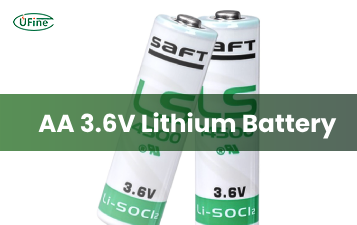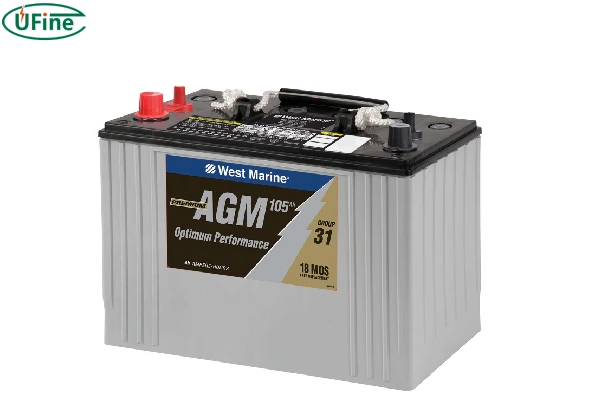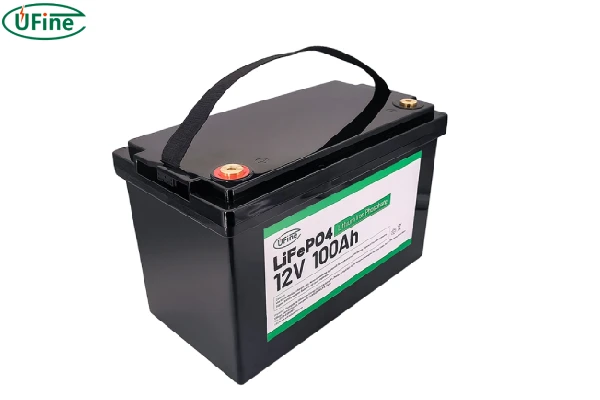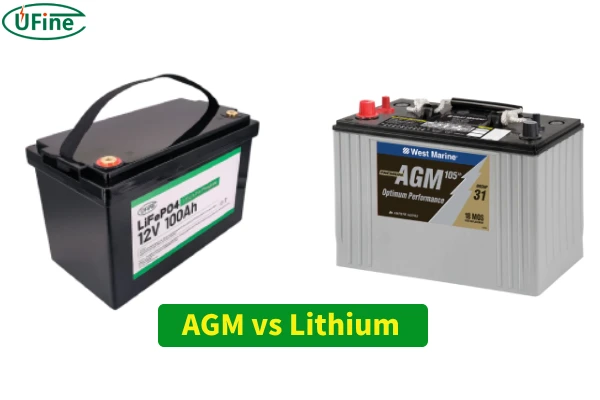Choosing the right battery for your needs can be challenging, especially with many available options. Group 31 batteries are popular for many applications, but how do you decide between AGM (Absorbent Glass Mat) and lithium-ion types? Each has its own set of features, advantages, and potential drawbacks. This comprehensive guide will explore the differences between Group 31 AGM and lithium-ion batteries, list their pros and cons, and help you determine which one best suits your specific needs.
Part 1. Learn about Group 31 AGM battery
A Group 31 AGM battery is a lead-acid battery that utilizes Absorbent Glass Mat (AGM) technology. This technology involves a fiberglass mat that absorbs and holds the battery’s acid, making it spill-proof and maintenance-free. AGM batteries are known for their durability and capacity to deliver high currents, making them ideal for various demanding applications.
Features of Group 31 AGM Battery
- Spill-Proof Design: The glass mat absorbs the electrolyte, preventing leaks even if the battery is broken or punctured.
- Maintenance-Free: Unlike traditional flooded batteries requiring regular water refilling, AGM batteries do not need routine maintenance.
- Vibration Resistant: Their robust construction allows AGM batteries to withstand vibrations and shocks, making them suitable for mobile applications.
- Longer Lifespan: AGM batteries typically last longer than traditional flooded lead-acid batteries due to their enhanced construction.
- Low Self-Discharge Rate: These batteries can be stored for extended periods without losing significant charge, making them ideal for standby applications.
Part 2. Group 31 AGM battery pros and cons
Pros
- Durability: AGM batteries are built to endure rough conditions, including extreme temperatures and constant vibrations.
- Maintenance-Free: No need to check water levels or perform regular maintenance.
- Safety: The spill-proof design minimizes the risk of leaks and corrosion.
- Reliability: AGM batteries provide consistent power output, which is crucial for applications requiring steady energy.
- Versatility: Suitable for a wide range of uses, including marine, RV, and backup power systems.
Cons
- Weight: AGM batteries are heavier than many other types, which can be a drawback in applications where weight is a critical factor.
- Cost: While cheaper than lithium-ion batteries, AGM batteries are more expensive than traditional flooded lead-acid batteries.
- Efficiency: AGM batteries have lower energy density compared to lithium-ion batteries, meaning they store less energy for a given size and weight.
Part 3. Learn about Group 31 lithium-ion battery
Group 31 lithium-ion batteries represent the cutting edge of battery technology. These batteries use lithium compounds for energy storage, which allows them to store more energy per unit of weight and volume compared to traditional lead-acid batteries. Lithium-ion batteries are becoming increasingly popular in applications where performance and weight are critical considerations.
Features of Group 31 Lithium-Ion Battery
- Lightweight: Significantly lighter than lead-acid batteries, which is beneficial for mobile and portable applications.
- High Energy Density: Lithium-ion batteries can store more energy in a smaller space, offering excellent energy efficiency.
- Long Lifespan: These batteries have a much longer lifespan than lead-acid batteries, often lasting several years with proper care.
- Fast Charging: Lithium-ion batteries can be recharged much faster than their lead-acid counterparts, reducing downtime.
- Low Self-Discharge Rate: They retain their charge well over Time, making them suitable for applications where the battery may not be used frequently.
Part 4. Group 31 lithium-ion battery pros and cons
Pros
- Lightweight: Easier to handle, install, and transport due to their lower weight.
- High Efficiency: High energy density means more power in a smaller and lighter package.
- Long-Lasting: Lithium-ion batteries often have a lifespan that exceeds AGM batteries, especially when properly maintained.
- Fast Charging: Reduces downtime with quicker charging cycles, which is advantageous for applications needing frequent use.
- Low Maintenance: Requires minimal upkeep, making them convenient for users.
Cons
- Cost: Higher initial investment compared to AGM batteries, but this can be offset by their longer lifespan and efficiency.
- Temperature Sensitivity: Performance can be affected by extreme temperatures, requiring more careful management.
- Safety Concerns: There is a risk of thermal runaway if the battery is damaged or improperly handled, which can lead to overheating and potential fire hazards.
- Complexity: Requires specialized chargers and battery management systems (BMS) to ensure safe and efficient operation.
Part 5. Group 31 AGM battery vs. Group 31 lithium-ion battery
Choosing between a Group 31 AGM and a lithium-ion battery involves understanding the key differences and how they align with your specific needs.
| Feature | Group 31 AGM Batteries | Group 31 Lithium-Ion Batteries |
|---|---|---|
| Lifespan | 4 to 7 years | 10 to 15 years |
| Weight | Heavier (typically around 60-75 pounds) | Lighter (typically around 30-50 pounds) |
| Energy Density | Lower energy density | Higher energy density |
| Maintenance | Maintenance-free but requires periodic checks | Maintenance-free |
| Cost | Lower upfront cost | Higher upfront cost |
| Charge Efficiency | Moderate (85% to 90%) | High (95% to 99%) |
| Depth of Discharge (DoD) | Up to 50% for best longevity | Up to 80%-100% with minimal impact on lifespan |
| Cycle Life | 500 to 1,000 cycles | 2,000 to 5,000 cycles |
| Operating Temperature Range | Wide, but performance can drop in extreme cold | Wide, but better performance in extreme temperatures |
| Safety | Safe, but can spill if damaged | Safe, with Built-in BMS (Battery Management System) to prevent overcharging and overheating |
| Environmental Impact | More recyclable materials | Less recyclable, but fewer replacements needed due to longer lifespan |
Part 6. Which Group 31 battery should I choose?
Choosing the right battery depends on your specific requirements and priorities. Here are some considerations to help you decide:
Choose a Group 31 AGM Battery If:
- You need a durable and reliable battery for rough conditions: AGM batteries are robust and can handle vibrations and extreme temperatures well.
- You want a maintenance-free option: AGM batteries do not require regular checks or water refilling.
- You are looking for a cost-effective solution: While more expensive than traditional flooded batteries, AGM batteries are cheaper than lithium-ion options.
- Safety is a top priority: AGM batteries are spill-proof and less likely to pose safety hazards.
Choose a Group 31 Lithium-Ion Battery If:
- You prioritize weight and space efficiency: Lithium-ion batteries are much lighter and more compact than AGM batteries.
- You need a long-lasting battery: With a longer lifespan, lithium-ion batteries reduce the frequency of replacements.
- Quick charging is essential: Lithium-ion batteries charge faster, minimizing downtime.
- You are willing to invest upfront for long-term benefits: Despite the higher initial cost, the extended lifespan and efficiency of lithium-ion batteries can offer better value over Time.
In conclusion, both Group 31 AGM and lithium-ion batteries have their unique advantages and disadvantages. Your choice will depend on factors such as weight, cost, lifespan, and specific application needs. By understanding these differences, you can make an informed decision that best suits your power requirements.
Related Tags:
More Articles

What You Need to Know About AA 3.6V Lithium Battery
Learn all about AA 3.6V lithium batteries—voltage, size, capacity, uses, and the best replacements. Discover why they’re powerful, and highly reliable.
What Are Lithium Salts and Why They Matter in Battery Electrolytes
Lithium salts in electrolytes are key to battery performance, powering everything from phones to EVs and shaping the future of clean energy.
Lithium AAA Battery Guide: Power, Performance & Chargers
Explore lithium AAA batteries—voltage, capacity, weight, top brands, and more. Learn how to choose the best battery for your device and why it really matters.
How to Calculate Watts, Volts, and Amps (With Simple Formulas and Examples)
Learn how to calculate watts, volts, and amps for lithium batteries with simple formulas and examples, ideal for EVs, solar, and energy systems.
Comprehensive Analysis of U.S. Tariffs on Chinese Lithium Batteries
U.S. tariffs on Chinese lithium batteries in 2025 impact costs, supply chains, and EV, energy storage, and electronics industries globally.






